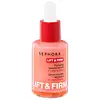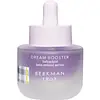What's inside
What's inside
 Key Ingredients
Key Ingredients

 Benefits
Benefits

 Ingredients Side-by-side
Ingredients Side-by-side

Water
Skin ConditioningPropanediol
SolventCoco-Caprylate/Caprate
EmollientPentylene Glycol
Skin ConditioningGlyceryl Stearate Citrate
EmollientTocopheryl Acetate
AntioxidantBakuchiol
AntimicrobialPolyacrylate Crosspolymer-6
Emulsion StabilisingHydroxyethyl Acrylate/Sodium Acryloyldimethyl Taurate Copolymer
Emulsion StabilisingSodium Benzoate
MaskingHelianthus Annuus Seed Oil
EmollientGlyceryl Caprylate
EmollientTocopherol
AntioxidantGlyceryl Stearate
EmollientPolysorbate 60
EmulsifyingSorbitan Isostearate
EmulsifyingRosmarinus Officinalis Leaf Extract
AntimicrobialWater, Propanediol, Coco-Caprylate/Caprate, Pentylene Glycol, Glyceryl Stearate Citrate, Tocopheryl Acetate, Bakuchiol, Polyacrylate Crosspolymer-6, Hydroxyethyl Acrylate/Sodium Acryloyldimethyl Taurate Copolymer, Sodium Benzoate, Helianthus Annuus Seed Oil, Glyceryl Caprylate, Tocopherol, Glyceryl Stearate, Polysorbate 60, Sorbitan Isostearate, Rosmarinus Officinalis Leaf Extract
Helianthus Annuus Seed Oil
EmollientCoco-Caprylate/Caprate
EmollientSimmondsia Chinensis Seed Oil
EmollientSqualane
EmollientBakuchiol
AntimicrobialTocopheryl Acetate
AntioxidantEclipta Prostrata Extract
Skin ConditioningMelia Azadirachta Leaf Extract
Skin ConditioningMelia Azadirachta Flower Extract
Skin ConditioningCorallina Officinalis Extract
Skin ConditioningCoccinia Indica Fruit Extract
Skin ConditioningMoringa Oleifera Seed Oil
EmollientSolanum Melongena Fruit Extract
Skin ConditioningAloe Barbadensis Flower Extract
EmollientCurcuma Longa Root Extract
MaskingOcimum Basilicum Flower/Leaf Extract
TonicOcimum Sanctum Leaf Extract
Skin ConditioningHelianthus Annuus Seed Oil, Coco-Caprylate/Caprate, Simmondsia Chinensis Seed Oil, Squalane, Bakuchiol, Tocopheryl Acetate, Eclipta Prostrata Extract, Melia Azadirachta Leaf Extract, Melia Azadirachta Flower Extract, Corallina Officinalis Extract, Coccinia Indica Fruit Extract, Moringa Oleifera Seed Oil, Solanum Melongena Fruit Extract, Aloe Barbadensis Flower Extract, Curcuma Longa Root Extract, Ocimum Basilicum Flower/Leaf Extract, Ocimum Sanctum Leaf Extract
Ingredients Explained
These ingredients are found in both products.
Ingredients higher up in an ingredient list are typically present in a larger amount.
Bakuchiol is a plant-derived antioxidant (it's vegan!). It is often called the replacement for retinol although it is not part of the same family.
It has similar effects as retinol: skin smoothing, reducing discoloration, and preventing wrinkles. It does not cause as much irritation as traditional retinoids.
Bakuchiol works by breaking down free radicals and stimulating collagen production in skin.
Combining bakuchiol with retinol will not have adverse side effects. Studies show using them will just boost the benefits. Bakuchiol is also found to help stabilize retinol.
While bakuchiol does not make the skin more sun sensitive, we recommend wearing SPF on a daily basis.
Read more about traditional retinol
Learn more about BakuchiolCoco-Caprylate/Caprate is created from fatty coconut alcohol, caprylic acid, and capric acid.
It is a lightweight emollient. Emollients create a thin barrier on the skin to trap moisture in. This helps keep your skin hydrated and soft.
Once applied, Coco-Caprylate/Caprate is absorbed quickly and leaves a silky feel.
Coco-Caprylate/Caprate may not be fungal acne safe.
Learn more about Coco-Caprylate/CaprateHelianthus Annuus Seed Oil is the oil derived from the seeds of a Sunflower. Sunflower seed oil is non-fragrant. It is an emollient, meaning it helps to soften the skin.
Sunflower seed oil contains many fatty acids. The fatty acids found in sunflower seeds include (from highest amount to least): linoleic acid, myristic acid, palmitic acid, stearic acid, arachidic acid, oleic acid, and linolenic acid.
These fatty acids help the skin create ceramides. Ceramides play a role in repairing the skin barrier.
Helianthus Annuus Seed Oil helps moisturize the skin. This in turn helps the skin look more rejuvenated and smoother.
Sunflowers are rich in vitamin E.
Historians believe Indigenous cultures of North America domesticated sunflowers before corn. Thus they relied on sunflower oil for a variety of uses. One such use is moisturizing skin and hair.
Sunflower seed oil may not be fungal acne safe. We recommend speaking with a professional if you have any concerns.
Learn more about Helianthus Annuus Seed OilTocopheryl Acetate is AKA Vitamin E. It is an antioxidant and protects your skin from free radicals. Free radicals damage the skin by breaking down collagen.
One study found using Tocopheryl Acetate with Vitamin C decreased the number of sunburned cells.
Tocopheryl Acetate is commonly found in both skincare and dietary supplements.
Learn more about Tocopheryl Acetate